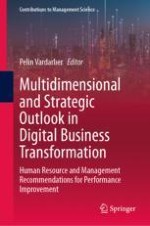Especially after globalization, it can be seen that there is an increase in competition for almost all industries. In order to survive in such a competitive environment, companies have to take some actions to increase their competitive power and sustainability. Effective digital transformation is a significant way for companies to reach this objective. This book explores digital transformation strategy and digital business strategy together with digital innovation and digital learning, adaptability, and agility to illustrate the importance of information technology in business today. The book argues that effective digital management can be provided by increasing the quality in audit, internal control, corporate governance, transparency and improving effective marketing strategies. It touches on concepts such as digital diversity, digital privacy, digital literacy, the digitization of international logistics. This book also provides department specific (e.g., marketing, finance, HR) theories and applications of digital technology to guide companies in determining their specific strategies.
